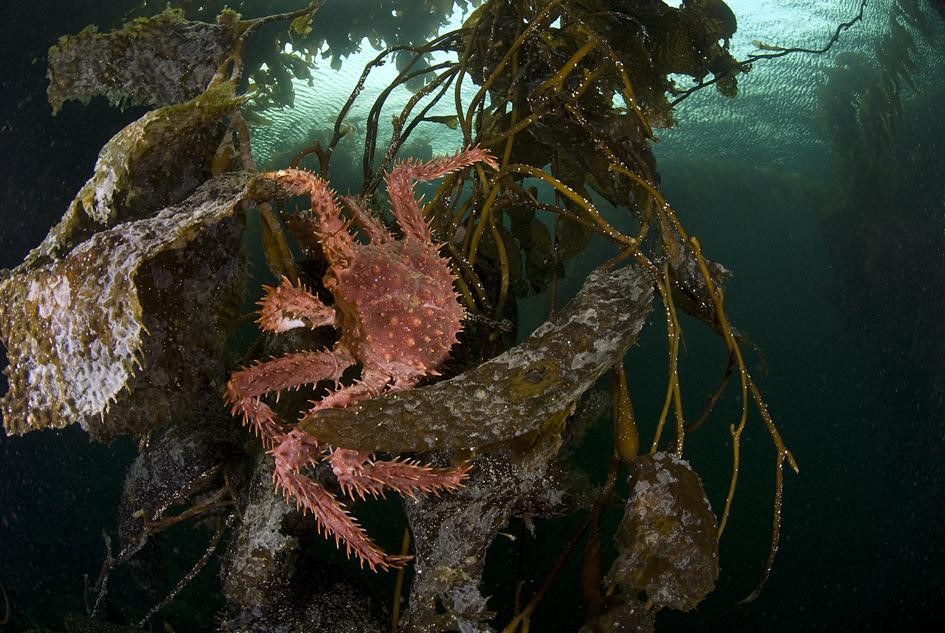


Southern king crab and kelp forest in the Chilean subantarctic region (photo: Mathias Hune)
Published on 03/25/2024
By Elton Alisson | Agência FAPESP – The Chilean portion of the subantarctic region in the far south of the Americas is one of the most untouched places in the world. It is considered a natural laboratory in which to observe the causes and consequences of global climate change in an environment scarcely altered by human activity.
Since 2000, Brazilian researchers, in collaboration with scientists at the University of Magallanes (UMAG) in Chile, have conducted studies in the region, which includes Cape Horn and part of the Beagle Channel.
The partnership has already resulted in publication of several scientific articles and books, as well as cooperation agreements. It was bolstered in 2023 by the establishment of the Cape Horn International Center for Global Change Studies and Biocultural Conservation (CHIC).
Located in Puerto Williams on Navarino Island in the Tierra del Fuego archipelago, CHIC serves as a strategic base for scientists to conduct transdisciplinary research in climatology, marine biodiversity, glaciology and terrestrial biology, among other fields.
With a budget of more than 10 billion Chilean pesos (now about USD 10.4 million) in a period of ten years, renewable for five more years, the project represents one of the largest investments ever made in science and technology in the region.
“Through CHIC, a group of more than 80 researchers affiliated with UMAG and other institutions in various countries has conducted groundbreaking interdisciplinary work that combines science, education, arts and environmental ethics in programs of research, environmental education, conservation and sustainable tourism,” Flávio Berchez, a professor at the University of São Paulo’s Institute of Biosciences (IB-USP) and a participant in the project, told Agência FAPESP.
In October 2023, Berchez and six other Brazilian researchers took part in a workshop held at CHIC by the Chile-Brazil binational network for studies of subantarctic marine ecosystems to plan new lines of collaborative research.
One of the planned collaborative projects will investigate distribution patterns of species of marine algae and associated microorganisms along the South Atlantic coast, for example.
As global climate change proceeds, marine algal species and associated microorganisms may migrate to regions with milder temperatures, according to Mariana Cabral de Oliveira, a professor at IB-USP and also a member of the collaboration. “It would be interesting to see what biogeographical barriers there are in Brazil and Chile to this migration by floating masses of brown seaweed in the South Atlantic, for example. It’s important to assess the impact of the arrival of these masses on local flora,” she said.
Threat to giant algae
According to Oliveira, underwater kelp forests made up of giant algae that can be as long as 60 meters are found at Cape Horn. The giant algae are considered “environmental engineers” because of their role in structuring entire ecosystems. They continuously provide shelter, food, protection and an environment for reproduction by many organisms, including fish and the Southern king crab or centolla (Lithodes santolla). Studies have also shown that they afford natural protection against ultraviolet radiation for various marine organisms by filtering sunlight.
Owing to a genetic difference, the Cape Horn kelp forests are perennial, unlike those found in other parts of Chile. Some studies have suggested, however, that they may already have been affected by climate change.
Faster glacier thawing has led to an increase in offshore freshwater sediment discharge in coastal areas. The presence of this sediment in the water column can prevent sunlight from reaching the kelp. “This may cause losses or have other negative effects on the algae. We need to study this process in greater detail because change is already happening,” Oliveira said.
The rise in ocean temperatures has also led to a decrease in the supply of nutrients, which are more abundant in colder water, and has affected the growth of the kelp. The giant algae increase their rate of respiration in warmer water and grow more slowly as a result, Berchez explained.
“These and other factors may affect the kelp forests in the region. The phenomenon was first detected in Australia in 2011 and is occurring in other places. We need to find out if it’s also occurring in Cape Horn,” he said.
Greenhouse gas emissions
Climate change will affect terrestrial flora and fauna as well as the marine environment. The region is highly isolated geographically, with both the Andes and its permanent glaciers and the very dry Argentinian part of Patagonia to the north, and the ocean around it in all other directions.
A major concern is the rise in temperature in the region’s extensive peatlands. Peat is a spongy material that forms when organic matter, primarily plant material, partially decomposes in wetlands. It can be extracted, dried, and used for several purposes, including fuel. Some peat bogs are thawing and decomposing faster in response to warmer weather. Emissions of methane, one of the most potent greenhouse gases, have increased as a result.
“This is already happening in Siberia, for example. As decomposition accelerates, peatlands emit methane, a far more intense greenhouse gas than carbon dioxide. These emissions are being measured,” Berchez said.
The other members of the Brazilian collaboration are Pio Colepicolo Neto, a professor at the University of São Paulo’s Institute of Chemistry (IQ-USP); Luiz Mafra, a professor at the Federal University of Paraná (UFPR); and Oreste Alarcon and Paulo Horta, professors at the Federal University of Santa Catarina (UFSC).
Source: https://agencia.fapesp.br/51200